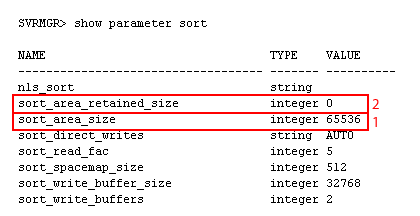Important Sorting Parameters

- This defines the maximum amount of PGA memory that can be used for disk sorts. For very large sorts, Oracle will sort data in its temporary tablespace, and the
sort_area_sizememory will be used to manage the sorting process. - This is a threshold that specifies the maximum amount of sort memory to retain for future sorts. When a sort is finished, any sort area memory in excess of this amount will be released.
Tuning Oracle Sorting
A small but very important component of Oracle tuning, sorting is often overlooked. An Oracle database will automatically perform sorting operations on row data under the following circumstances:
Whenever a sort cannot be completed within the assigned space, a disk sort is invoked using the temporary tablespace for the Oracle instance. A sort in the temporary tablespace is very I/O intensive and can slow down the entire database. As a general rule, the sort_area_size should be large enough that only index creation and ORDER BY clauses using functions should be allowed to use a disk sort. However, operations on large tables will always perform disk sorts. For example, the following query will sort the salaries for all 101,000 employees at Oracle Corporation:
- When an index is created
- When using the ORDER BY clause in SQL
- When using the GROUP BY clause in SQL
Whenever a sort cannot be completed within the assigned space, a disk sort is invoked using the temporary tablespace for the Oracle instance. A sort in the temporary tablespace is very I/O intensive and can slow down the entire database. As a general rule, the sort_area_size should be large enough that only index creation and ORDER BY clauses using functions should be allowed to use a disk sort. However, operations on large tables will always perform disk sorts. For example, the following query will sort the salaries for all 101,000 employees at Oracle Corporation:
select salary from employee order by salary;
Sort in RAM Space
Oracle always tries to sort in the RAM space within
sort_area_size and only goes to a disk sort when the RAM memory is exhausted. Disk sorts are expensive for several reasons.
- First, they consume resources in the temporary tablespaces.
- Oracle must also allocate buffer pool blocks to hold the blocks in the temporary tablespace.
- In-memory sorts are always preferable to disk sorts, and disk sorts will surely slow down an individual task, as well as affect concurrent tasks on the Oracle instance.
